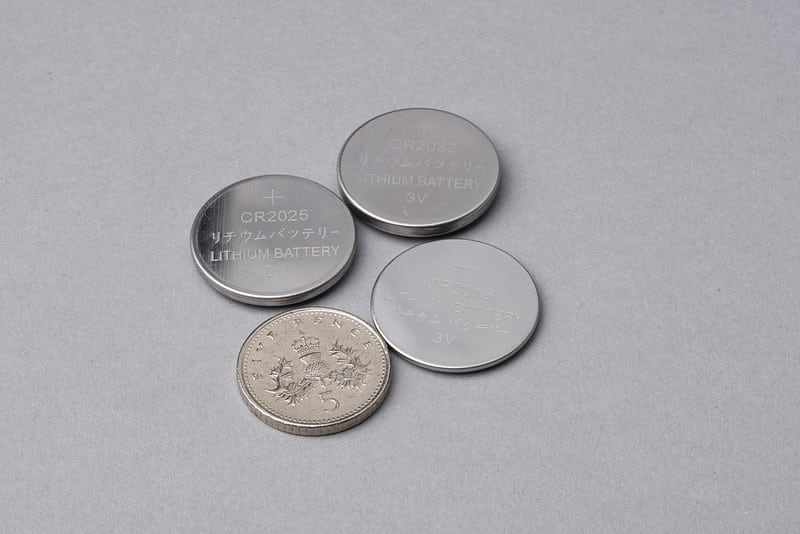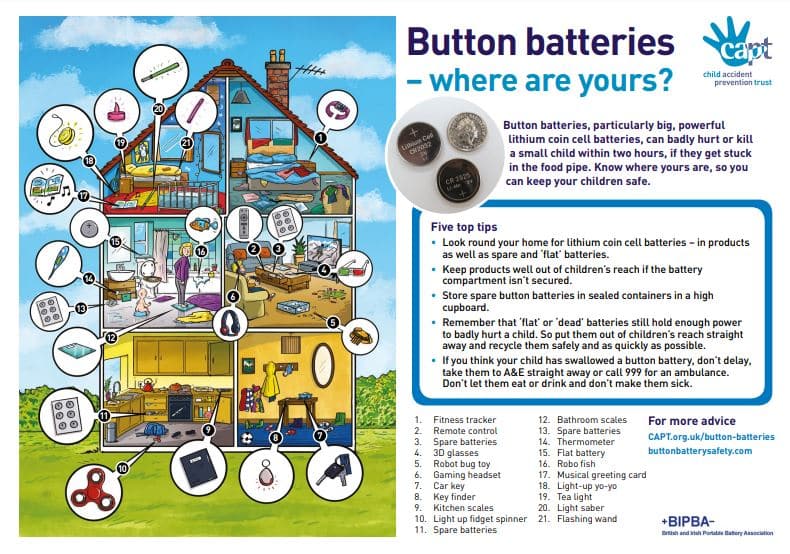You may have seen the tragic case of two-year old Harper-Lee Fanthorpe who died in May 2021 after swallowing a button battery from a remote control.
What are button batteries and where can I find them?
Button batteries are small, round, silver-coloured batteries that come in many different sizes and types. You might find them in:
- kitchen weighing scales
- thermometers – often used in children’s bedrooms and bathrooms
- bathroom weighing scales
- children’s interactive books
- remote controls
- wireless headphones
- car keys
- musical cards
- battery operated tealights and candles
- small, light up ‘pocket money’ toys
Why are button batteries dangerous?
Most button batteries pass through the body without a problem. But if a lithium coin cell (button) battery gets stuck in the food pipe, energy from the battery reacts with saliva to create caustic soda. This is the same chemical used to unblock drains! This can burn through the food pipe, to the main artery and lead to catastrophic internal bleeding and death. The chemical reaction can happen in as little as two hours. However, sometimes it takes days or even weeks. Lithium coin cell batteries can also cause life-changing injuries. There is a risk that the food pipe is too badly damaged for a child to eat normally again or the vocal cords are too badly damaged for a child to speak normally again.
Button battery dangers top tips
• Look round your home for lithium coin cell batteries – in products as well as spare and ‘flat’ batteries.
• Keep products well out of children’s reach if the battery compartment isn’t secured.
• Store spare button batteries in a sealed container in a high cupboard.
• Remember that ‘flat’ or ‘dead’ batteries will still badly hurt a child. So put them out of children’s reach straight away and recycle them safely and as quickly as possible.
• Take care when buying toys from markets, discount stores or temporary shops as they may not conform to safety regulations. Similarly, toys bought online or from overseas may not meet UK safety standards.
• Teach older children that button batteries are dangerous and not to play with them or give them to younger brothers and sisters.
• If you think your child has swallowed a button battery, don’t delay, take them to A&E straight away or call 999 for an ambulance. Don’t let them eat or drink and don’t make them sick
‘Flat’ batteries aren’t ‘flat’!
Many ‘flat’ lithium coin cell batteries still hold enough charge to burn a small child’s food pipe, if they swallow one and it gets stuck there. Many batteries are swallowed without the adults knowing and with the child too young to be able to tell them. There are many cases where the lithium coin cell battery has been lodged in the child’s food pipe for weeks before discovery. The symptoms can be vague and mimic common ailments, so it’s not always clear how dangerous the situation is.
Thankfully, while the potential consequences may be dire, the solution couldn’t be simpler:
- Keep your used ‘flat’ batteries well out of children’s reach, high up in a sealed container.
- Take them to recycling as soon as you can.
- Find out where you can take yours here recyclenow.com/what-to-do-with/batteries-1.
- Many shops that sell batteries are required to offering recycling – so when you grab your bags for the shops, grab your old batteries too.
The Button Battery Treasure Hunt
A great way to keep your family safe is to have a good look round each room and see just how many button batteries are in the items you use everyday – you’ll probably be amazed just how many are in the reach of your children. This video shows just how common they can be. Why not do a treasure hunt of your own today?





